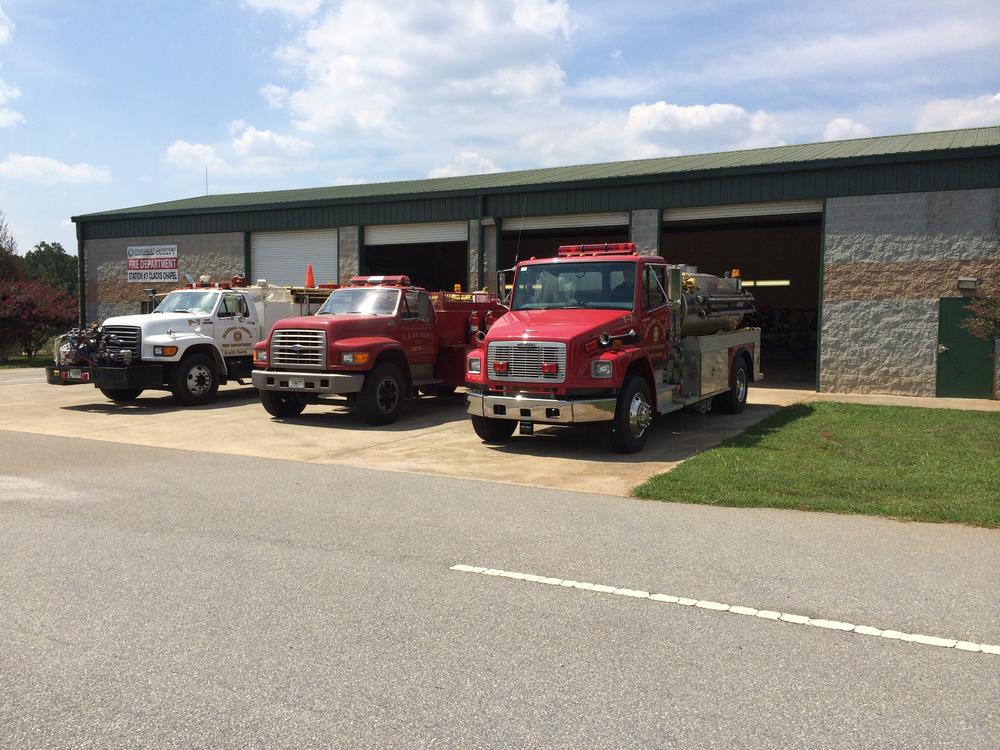
Caption
Morgan County will no longer use two fire stations as polls after a February 8, 2022 elections board vote.
Credit: Morgan County

Morgan County will no longer use two fire stations as polls after a February 8, 2022 elections board vote.
The elections board in heavily Republican Morgan County voted Tuesday to close a pair of little-used polls at fire stations after local redistricting changed precinct boundary lines.
In a 3-1 vote, the board voted to keep five existing polls to serve the five county commission and board of education districts, no longer using the Clacks Chapel and Bethany-Springfield fire stations in the rural county of about 15,000 voters straddling I-20 east of Atlanta.
Three-quarters of Morgan County’s registered voters are white, and 70% of voters cast ballots for former President Donald Trump in the 2020 election.
According to state voter registration data and election results, the two polling places had the highest percentage of Republican voters in the 2020 presidential race and the lowest Election Day turnout.
In the southwestern corner of the county, Clacks Chapel served about 700 registered voters in 2020, with 85% of them identified as white in state records. On Election Day, 150 people voted in the presidential race over the 12 hours polls were open, while 379 used the three week in-person early voting period and 74 by mail. Trump won 83% of that precinct’s votes.
In the southeastern part of the county, the Bethany-Springfield fire station had just under 900 registered voters assigned in 2020, about 80% white. That voting site saw slightly more Election Day voters, 172, and had 388 use in-person early voting while 137 returned mail-in absentee ballots. 79% of its votes were for Trump.
Many voters in the two old precincts will have to travel several miles to get their new voting site if they cast their ballot on Election Day.
While Georgia counties have shuttered more than a tenth of the state's polling sites in the decade since the U.S. Supreme Court ended federal oversight over voting changes in states like Georgia with a long history of discriminatory voting laws, officials in rural counties say limited resources, dwindling volunteer workers and a shift towards absentee voting have spurred these decisions.
Elections director Jennifer Doran said there were many factors that led to the consolidation of the polls in her county, such as limited parking with the two remote fire stations, and added the county offers transit for those who need it to get to the polls.
"There are issues with parking that do block the fire station bays, so the fire trucks can't get out," she said. "Because of their being so rural, there are no other buildings that really can accommodate the voters."
In both the June 2020 primary and the January 2021 U.S. Senate runoff elections, Morgan County did not open the Clacks Chapel and Bethany-Springfield sites due to a number of poll workers being infected by COVID-19 or quarantining because of exposure.
Morgan County is also one of several smaller counties that has seen their elections board structure reconstituted by state lawmakers in recent months, part of a trend that voting rights groups say is meant to limit Democratic voices in these Republican-controlled counties.
But like Lincoln County on the South Carolina border, whose efforts to close all but one voting site has been temporarily blocked by voting rights groups, the reality reflects a more complicated picture.
In September 2020, the GOP-dominated county commission received a request to remake the elections board due to partisan bickering and infighting caused by the board's two Democratic and two Republican appointees. A review of meeting minutes shows even motions to adjourn were deadlocked, with the board's chairman having to break the tie.
Many counties in Georgia still have partisan-influenced elections boards, though a 2018 Georgia Supreme Court ruling has weighed heavily in more recent changes.
There, judges found that non-governmental groups could not directly select members of the DeKalb County Ethics Board, which has led lawmakers to add language to election board changes that moves appointments away from political parties to local governments, instead.
Now Morgan County's board is appointed entirely by the county commission, and the board's current iteration includes two longtime former poll workers and a calmer atmosphere.
Not everyone at the meeting was supportive of the changes.
Morgan County Democrats chair Ann Clarke expressed concern about notifying voters of the changes.
"Your proposal to align precincts with commission and education districts makes sense on paper, it really does," she said. "And it may be good for the long term. But it also means a large number of Morgan County voters will have a new place to vote on Election Day this year, and some of them will not know about the change until they arrive at their familiar polling place."
Elections board member Mary Kay Clyburn also voiced concerns with ensuring affected voters would be notified in a manner that catches their attention, both for the polling place consolidation and other changes brought on by local redistricting.
"I don't know how else to get that information out," she said, before voting against the proposal. "Some people when they get their precinct card, I don't know if they're just gonna say 'Oh, I know where to vote.'"
All Georgia voters should check their registration information, including polling place location, state legislative and Congressional districts and precinct information in the coming weeks as lawmakers finish approving new district boundary lines. You can contact your county elections office or check online at the state's My Voter Page.